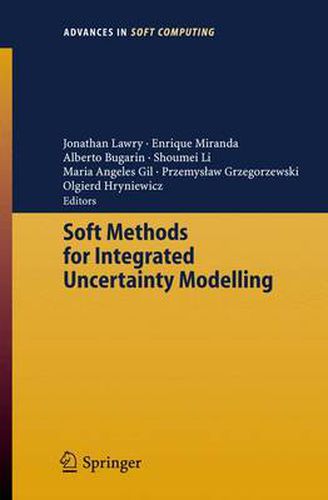Readings Newsletter
Become a Readings Member to make your shopping experience even easier.
Sign in or sign up for free!
You’re not far away from qualifying for FREE standard shipping within Australia
You’ve qualified for FREE standard shipping within Australia
The cart is loading…






This title is printed to order. This book may have been self-published. If so, we cannot guarantee the quality of the content. In the main most books will have gone through the editing process however some may not. We therefore suggest that you be aware of this before ordering this book. If in doubt check either the author or publisher’s details as we are unable to accept any returns unless they are faulty. Please contact us if you have any questions.
The idea of soft computing emerged in the early 1990s from the fuzzy systems c- munity, and refers to an understanding that the uncertainty, imprecision and ig- rance present in a problem should be explicitly represented and possibly even - ploited rather than either eliminated or ignored in computations. For instance, Zadeh de?ned ‘Soft Computing’ as follows: Soft computing differs from conventional (hard) computing in that, unlike hard computing, it is tolerant of imprecision, uncertainty and partial truth. In effect, the role model for soft computing is the human mind. Recently soft computing has, to some extent, become synonymous with a hybrid approach combining AI techniques including fuzzy systems, neural networks, and biologically inspired methods such as genetic algorithms. Here, however, we adopt a more straightforward de?nition consistent with the original concept. Hence, soft methods are understood as those uncertainty formalisms not part of mainstream s- tistics and probability theory which have typically been developed within the AI and decisionanalysiscommunity.Thesearemathematicallysounduncertaintymodelling methodologies which are complementary to conventional statistics and probability theory.
$9.00 standard shipping within Australia
FREE standard shipping within Australia for orders over $100.00
Express & International shipping calculated at checkout
Stock availability can be subject to change without notice. We recommend calling the shop or contacting our online team to check availability of low stock items. Please see our Shopping Online page for more details.
This title is printed to order. This book may have been self-published. If so, we cannot guarantee the quality of the content. In the main most books will have gone through the editing process however some may not. We therefore suggest that you be aware of this before ordering this book. If in doubt check either the author or publisher’s details as we are unable to accept any returns unless they are faulty. Please contact us if you have any questions.
The idea of soft computing emerged in the early 1990s from the fuzzy systems c- munity, and refers to an understanding that the uncertainty, imprecision and ig- rance present in a problem should be explicitly represented and possibly even - ploited rather than either eliminated or ignored in computations. For instance, Zadeh de?ned ‘Soft Computing’ as follows: Soft computing differs from conventional (hard) computing in that, unlike hard computing, it is tolerant of imprecision, uncertainty and partial truth. In effect, the role model for soft computing is the human mind. Recently soft computing has, to some extent, become synonymous with a hybrid approach combining AI techniques including fuzzy systems, neural networks, and biologically inspired methods such as genetic algorithms. Here, however, we adopt a more straightforward de?nition consistent with the original concept. Hence, soft methods are understood as those uncertainty formalisms not part of mainstream s- tistics and probability theory which have typically been developed within the AI and decisionanalysiscommunity.Thesearemathematicallysounduncertaintymodelling methodologies which are complementary to conventional statistics and probability theory.